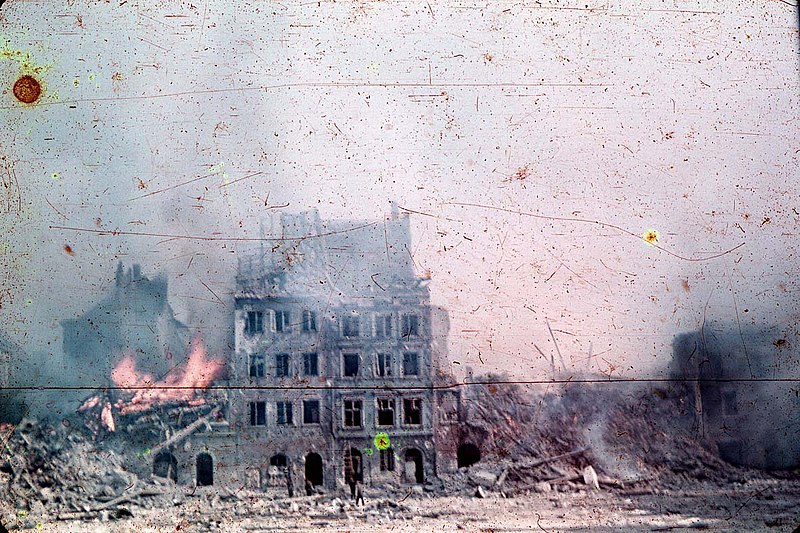
On this date 75 years ago the Warsaw Uprising of the Polish Home Army ended.
While the collaboration of Hitler's National Socialists and Stalin's Communists triggered the start of World War Two with their Non-Aggression Pact in August 1939 and joint invasion of Poland the following month, Hitler's betrayal and attack upon the Soviet Union two years later has obscured one final act of regime collaboration in 1944.
By the summer of 1944, Poland had been occupied for almost five years. Most of Poland's 3.3 million Jews were dead and the series of extermination groups dedicated to that task, including Treblinka and Sobibor, had ceased operations and been demolished. Perhaps another 2 million Poles were also dead. In all, at least 5 million gone from a pre-war population of 30 million.
June 1944 is remembered in the West for the D-Day invasion in Normandy on June 6 but another event of momentous consequence took place on the Eastern Front that same month. Since November 1942, the Soviets had launched a series of offensives pushing the Germans back almost to pre-war borders in many areas except in the center of the front where the Nazis still held a bulge of territory in what is now Belarus, an area defended by Army Group Centre.
On June 23, 1944 the Red Army launched a titanic offensive catching the Germans unprepared and within a couple of weeks destroying most of the Wehrmacht forces. As Soviet armor and infantry raced towards the Vistula River and Warsaw, the Polish Home Army debated how to react.
The Home Army was the coordinator of Polish resistance, beginning its work shortly after Poland was occupied in 1939. It had between 25,000 and 50,000 people in Warsaw, willing to fight, but hampered by a lack of arms, and in a city in which about a quarter of the buildings were already destroyed from German bombing in September 1939 and in the fighting during the Warsaw Ghetto uprising in the spring of 1943, when the remaining Jews of the ghetto rose up against the Nazis.
One option was to wait for what seemed the imminent liberation of Warsaw by fast-advancing Soviet forces, the other to stage an uprising, evict the Germans, and greet the Soviets with the Polish capital liberated by its own people.
There was little chance of waiting for the Soviets. There was already great mistrust of the communists because of their brutality when they occupied eastern Poland from 1939 until 1941. That mistrust grew when, in September 1943, the retreating Germans announced they found the bodies of about 15,000 Polish officers in the Katyn Forest, claiming they'd been executed by the Soviets in 1940. The officers had surrendered to the Soviets in September 1939 and until spring of the following year relatives occasionally had news of them. After that, silence. While the Soviets claimed the Nazis murdered the officers, the Poles were convinced that Stalin was to blame. Fifty years later, in the wake of the fall of the Soviet Union, the documents recording the Politburo decision in March 1940 to conduct the executions were publicly released.
The Home Army also suspected that if it did not rise up and the Soviets occupied Warsaw without its help, they would be denounced by the communists as Nazi collaborators. The Poles felt they would be in a stronger position to determine their country's postwar fate if they liberated Warsaw.
On August 1, 1944 the Home Army rose up, seizing buildings and killing Germans. Caught off guard, the German garrison initially retreated and the Poles occupied a sizable portion of the city.
But Hitler and the Nazis would not sit back. Less than two weeks before Hitler survived an assassination and coup attempt which left him injured. He wanted revenge on all his enemies and he had always hated the Poles. Heinrich Himmler pointed out with perverse logic the opportunity presented by the revolt:
My Führer, the timing is unfortunate, but from a historical perspective what the Poles are doing is a blessing. After five, six weeks we shall leave. But by then Warsaw, the capital, the head, the intelligence of this former 16–17 million Polish people will be extinguished, this Volk that has blocked our way to the east for seven hundred years and has stood in our way ever since the First Battle of Tannenberg [in 1410]. After this the Polish problem will no longer be a great historical problem for the children who come after us, nor indeed will it be for us.Ordering reinforcements to the city, the Germans reentered, initially killing everyone they found; men, women, and children. Tens of thousands died. The massacre strengthened the resistance because Poles felt they had no alternative but to fight. Eventually the Germans realized the strategy was a mistake stopped the deliberate mass killing of civilians, though many continued to die in the fighting and all Home Army soldiers were executed if captured.
All through the rest of August and into September, the Germans very slowly advanced through the city.
Leading one company of the Home Army was Captain Witold Pilecki, whose life provides one of the finest examples in the 20th century of moral and physical courage, a man of whom, many years later, the Chief Rabbi of Poland was to write, "When God created the human being, God had in mind that we should all be like Captain Witold Pilecki, of blessed memory".
In his epic account of the uprising, Rising '44: The Battle for Warsaw, Norman Davies describes Pilecki's role in frustrating the initial German counterattack:
. . . a company led by Capt. Roman [the name Pilecki was known by] repeatedly invested a strategic building which overlooked the traffic on the boulevard Roman . . . Almost every day during the first two weeks of the month, he captured, lost, and recaptured this building. Repeatedly driven out, he repeatedly returned and with deadly cunning repeatedly expelled the German defenders . . . so long as he threatened this one vital pressure point, the German command was constantly made to feel insecure. One is tempted to suggest that a single company could have won the Rising a fortnight's reprieve.For more on the life of this remarkable man read Volunteering For Auschwitz.
Warsaw Old Town during the Uprising

And what were the Soviets doing during the desperate struggle of the Home Army? Nothing. The Red Army halted its advance on the outskirts of Warsaw, claiming it had exhausted equipment and supplies in the rapid advance of the prior weeks. There was truth in this. Yet the Soviets also refused to provide any material aid to the Poles fighting on the other side of the Vistula. Why would they, when Hitler was doing Stalin's work, destroying the only organized anti-communist resistance on the ground in Poland?
Winston Churchill sought to help the Poles, bombarding Stalin with personal requests for Red Army assistance, to allow British and American planes to drop supplies over Warsaw and use Red Army air base to land and refuel. Stalin refused all such requests for much of the time and, to his shame, Franklin Roosevelt refused Churchill's requests to join him in the appeals to Stalin.
Nonetheless, Churchill ordered supply efforts from bases in England and Italy flown by British, Polish, and South African crews. Because the planes could not use Soviet airbases to refuel the number of missions and amount of supplies able to be transported was limited. Approximately 300 Allied airmen died in these missions.
After mid-September, when it became clear the Home Army revolt would fail, Stalin relented, approving some Soviet supply efforts and the use of air bases by Western aircraft.
At the same time, the Germans realized that while the situation of the Poles was hopeless they would keep on fighting, prolonging the street battles for weeks or even months, prompting the Nazis to do what they had never done before in Occupied Europe - negotiate with the Resistance, ultimately agreeing to treat any surrendered Home Army soldiers as Prisoners of War.
On October 2, the Home Army ceased fighting and thousands of its soldiers, including Pilecki, were sent to POW camps (the Germans kept their side of the bargain).
Including civilians, about 200,000 Poles died during the Uprising. The Germans, who incurred 11,000 dead and wounded, expelled all surviving civilians from Warsaw and began to systematically destroy what was left of the city. By the time the Soviets finally captured the city in January 1945, about 85% of prewar Warsaw was demolished.
The Soviet occupation of Poland was completed by February 1945. Behind the Red Army came Stalin's secret police who executed, imprisoned or sent to the Gulag the remnants of the Home Army and anyone else who might object to communist domination of the country. Witold Pilecki, who after release from the POW camp, made his way to join Polish forces in Italy, volunteered to return to Poland and organize resistance against the communists. He was arrested in 1947 and secretly executed shortly thereafter. Today he is recognized as a Polish national hero.
No comments:
Post a Comment